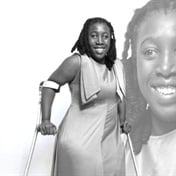
Marie James (50) from Durban was retrenched and faced major financial turmoil resulting in her declaring personal bankruptcy. After a four-year struggle to regain financial security, she’s finally in a place where things don’t seem as bleak.
Marie shares her story of declaring bankruptcy, selling her assets and the emotional trauma she dealt with during this tumultuous financial time in her life.
Here’s her story
“The irony is that you have to have money in order to declare yourself bankrupt.
To ensure a benefit will accrue to your creditors, you need to have money to pay your 20c to the rand. That’s why even in the pain and suffering of realising you’re insolvent, you need to keep a clear head and realise it’s purely a personal business decision. My insolvency lawyer said: ‘Business is business; the banks will give you money, they know that it’s a risk. You pay for their money, they supply you with a service and if you can’t pay, well – you can’t pay. So, don’t feel guilty for declaring yourself bankrupt. Don’t feel guilty for not giving them their money. It's business to them.’
There are two types of sequestration/bankruptcy/insolvency. Voluntary sequestration and hostile sequestration.
If you’re wise enough and see the writing on the wall soon enough, then the best option is a voluntary sequestration. You take whatever little money you have and go to the court and request to be declared insolvent. This hurts. It’s probably one of the most painful things aside from divorce that you can voluntarily impose on yourself. Self-worth and pride are the biggest targets for your bankruptcy pain. But by declaring yourself bankrupt, you protect yourself from the never-ending barrage of creditors – in fact, it’s the court who protects you. With the pain, comes comfort. Knowing the court is your protector. The words ‘Talk to my lawyer’ has never sounded so sweet. But you need your benefit to creditors; your 20c to the rand. You need money.
If you don’t have money, you’re at the mercy of your creditors; and they’re a tough bunch. Ruthless money lenders who will go so far as to sell your debt to even more ruthless bounty hunters. And this debt will hunt you across the country, across the oceans and into foreign lands. There’s no end to their timeline. Once the debt is paid, only then will they be done with you.
The courts insist on some form of proof that the applicant has attempted debt counselling. Occasionally for some, there’s a moment in the debt counselling process where you come to a tipping point; where you need to be able to see clearly enough to know that even debt counselling is no longer beneficial to you.
My first shock when meeting with my insolvency lawyer was that I should have gone to him earlier. Every single cent I’d spent on debt counselling, past that tipping point, was a waste of money because I could have used it to put towards my 20c to the rand. My lawyer reminded me that the debt counselling company was using my pending bankruptcy to make money from me, therefore costing me more money the longer I tried to stay on my sinking ship.
A large number of debt counselling scenarios fail anyway. Mine did. My anger and disappointment bubbled over when I realised that even though my intentions of trying to stick it out had been so valiant, I had in fact made a grave error in my decisions at such a crucial point in my personal finances.
Then there’s the personal stuff. Aside from wounded egos, there is the earth-shattering pain of selling your entire life’s belongings. Watching some young schmuck (I’m sure he was actually quite a nice guy, but my brain had concocted some evil persona for him) drive away in my beautiful high-end car that I’d bought new off the showroom floor and driven over 140 000km in.
Trying to be brave while filling out forms from some really gentle and respectful asset division guy (brain had declared him to be horrible and mean); and watching as he and the nice young guy (brain’s schmuck) drove away. The dam broke. I couldn’t hold back any longer. I turned around and collapsed into a pathetic crying heap of blubber, right there, outside on the driveway.
Your lifestyle suddenly changes. All of a sudden you’re living in the smallest possible place you can; driving the oldest possible car you can find for cash and you eventually have to shrug off the fact that you really don’t care what people think.
One thing I’ve definitely learnt over the rehabilitation period is that the court says after four years you can apply to have your estate rehabilitated; go to court, prove your good track record, and regain your life. Or, after 10 years, your estate becomes automatically rehabilitated so you don’t have the cost of going to a high court to get it done.
One of the most valuable lessons I’ve learnt over the four years of my bankruptcy period is that the timeline is absolutely critical. When you declare yourself bankrupt, you don’t realise that you’ve fallen into poor borrowing and spending habits.
It’s all about breaking these financial habits. You cannot borrow money; you cannot go to the bank to ask for a loan or an overdraft; they will not give it to you, and if they do – well they’re darn stupid, because that’s reckless lending. There’s no law that says that cannot lend to you. No law that says you cannot open a bank account; no law that says you cannot buy yourself a house. But they shouldn’t give it to you, and they generally won’t. So, you’re forced to pay cash; you’re forced to come up with ways of following your money; you’re forced to budget to the absolute last cent. Your spending habits start to morph.
As my four years start to wind around, I begin to think, that maybe, I’m enjoying this discipline that’s forced on me; maybe I don’t actually want to claim my rehabilitation after four years; maybe I won’t be ready at that stage. Perhaps I should just wait my 10 years out. Renting isn’t bad; it’s is cheaper than owning property. At this stage, every cent saved is a cent gained on your rehabilitation.
At first, I conveniently thought my sequestration had nothing to do with the choices I’d made, thereby exempting me from any wrongdoing. It was circumstantial. I was retrenched, and in a fickle job market, a new lucrative job was two years in the making. But then I realised that the choices from retrenchment onwards – your spending, your borrowing – those are still choices you make. Bad personal finance decisions which we all make.
At the end of it, I have one thing to take away with me. At the age of 50, I have nothing. No retirement funds; no saving. I an starting all over again – learning to reinvent myself and finding new ways of earning a living and saving my money. At the same time, as I have started off with absolutely nothing, there’s an upside. I’ve started off with no debt. I don’t have to spend the next 10 years paying off my debt to businesses who sold me money.
I wear my bankruptcy with hard-earned, hurt pride, and in future shall be careful how I look after my money.
Paying money to businesses who make money by selling me money doesn’t make good financial sense to me anymore.”
*Not her real name




 Publications
Publications
 Partners
Partners
















